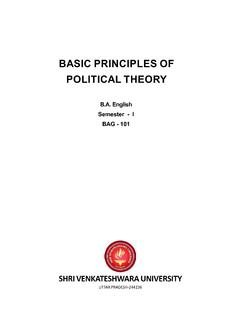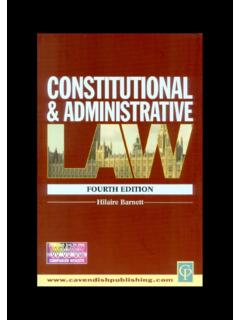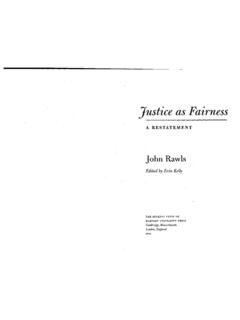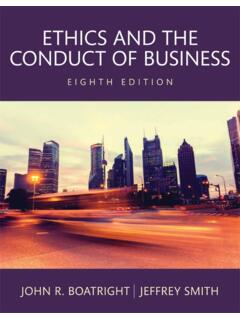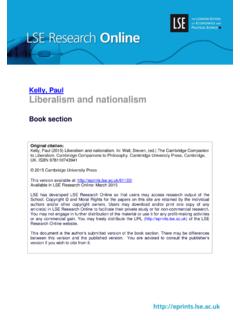Transcription of COMPARING THE SOCIAL CONTRACTS OF HOBBES AND LOCKE
1 The Western Australian Jurist Vol. 1, 2010 123 COMPARING THE SOCIAL CONTRACTS OF HOBBES AND LOCKE THOMAS MOURITZ Abstract LOCKE and HOBBES both share a vision of the SOCIAL contract as instrumental in a state's political stability. However, their respective philosophies were informed by a starkly contrasting vision of human nature. This essay explores the historical context of each philosopher and considers the differences in the SOCIAL contractual theory that emerged from their distinct perspectives on the state of nature.
2 I THE STATE OF NATURE AND THE SOCIAL contract The notion of the SOCIAL contract has been, quite simply, one of the most important paradigms of Western philosophical and legal theory in helping to shape our understanding of justice and SOCIAL Sharing some elements of thought, though differing in many more, 17th century Englishmen Thomas HOBBES and John LOCKE stand out as amongst the most significant proponents of SOCIAL contract theory . Held up against the light of contemporary scrutiny, analysis may expose flaws and weaknesses in their arguments.
3 However, even more so it reveals that the sophisticated methods they employed, the scope and structure in their observations of complex, ubiquitous principles, and the depth of their impact in modern thinking ascribes them undeniable stature and demonstrates the enduring value we can still gain from reviewing and COMPARING their work on SOCIAL contract theory . HOBBES and LOCKE were not the first to use the SOCIAL contract model as a tool to explain the foundations of human society; earlier exponents of the theory can be traced much further back in history.
4 Arguably, elements of the SOCIAL contract have existed as long as ethical theories have been publicly espoused and recorded in For example, in Ancient Greece we find Plato s Republic describing a friendly communal debate about the meaning of justice in which Thrasymachus and Glaucon introduce principles of SOCIAL contract theory ,3 and conceptions of human nature,4 that have been elaborated upon by countless thinkers since, not least among them HOBBES and LOCKE . While the Completed his LLB/BA (Sustainable Development) in early 2010 and is currently working as a sustainability and planning practitioner in Sydney, and completing his Honours in Sustainable Development with a research focus on the establishment of carbon rights in Indonesia.
5 1 Robert C Solomon, Introducing Philosophy: A Text with Integrated Readings (Oxford University Press, 9th ed, 2008) 566. 2 Montague Brown, The Quest for Moral Foundations: An Introduction to Ethics (Georgetown University Press, 1996) 36. 3 Plato, Plato s Republic (Dent, 1969) 12-46. 4 J W Gough, The SOCIAL contract theory : A Critical Study of its Development (Oxford University Press, 1936) 100. The Western Australian Jurist Vol. 1, 2010 124 mechanical principles of materialism 5 are generally emphasised as the shaping foundations of both humanity s SOCIAL CONTRACTS , it also has to be recognised that HOBBES and LOCKE shared a grounding in the classics that was similarly influential in forming their views on political philosophy and human The links between the pair.
6 Both regarded for their SOCIAL contract theory and with a common debt to classical philosophy and to the influence of materialist thought, begin to wane when the substance of their work is analysed more closely. Vastly different individual circumstances helped define striking distinctions in personal outlook. HOBBES notably grim SOCIAL contract theory , at its core reflecting what he believed was the brutal, nefarious reality of instinctive human behaviour, was surely a product of a worldview that could not overlook the troubled time he lived in.
7 For much of his life, HOBBES world was one of political upheaval and war; the Thirty Years War was taking place in Europe, and a Civil War drastically transformed political dimensions in England. These extended periods of tumult fashioned a pessimistic outlook on human nature, and instilled in HOBBES a strong conviction for an absolute monarchy, believing that ultimately the only capable form of SOCIAL governance was a sovereign with unrestricted ruling power .7 LOCKE reached his intellectual maturity in the more settled years after the English Civil War, and was politically associated with the Whigs, who pushed for a limited He felt that an effective sovereign did not require absolute rule and, rather, pushed for more individual freedoms.
8 In fact, if we accept that the aim of HOBBES SOCIAL contract was to establish the necessary conditions for an all-powerful sovereign, we find in turn that LOCKE s SOCIAL contract had an altogether antipodean argument. Partly as a result of his involvement in an attempt to prevent Charles II s royal absolutist younger brother James from succeeding the throne, LOCKE s intention was to justify the peoples ability to resist absolute monarchy through rights granted in a mixed Aware of the moulding contexts from which HOBBES and LOCKE arose, and the ultimate conclusions that they were trying to reach and justify with their respective versions of the SOCIAL contract .
9 We may then retreat to the essence of their theory and observe the different ways in which they developed their arguments to achieve their goals, which in turn provides ample opportunity for critical analysis. One of HOBBES defining features is the method in which he chooses to relate his SOCIAL contract . HOBBES was adamant that a rigorous, rational argument was necessary to cure the ills of an ailing state political structure based on bad reasoning .10 As a materialist 5 John Rawls, Lectures on the History of Political Philosophy (Harvard University Press, 2007) 29.
10 6 Rawls, above n 5, 29. 7 Dora Kostakopoulou, Floating Sovereignty: A Pathology or a Necessary Means of State Evolution? (2002) 22(1) Oxford Journal of Legal Studies 135, 141. 8 Gough, above n 4, 127. 9 Rawls, above n 5, 105. 10 Jean Hampton, HOBBES and the SOCIAL contract theory (Cambridge University Press, 1988) 1. The Western Australian Jurist Vol. 1, 2010 125 he was convinced that sound reason must possess geometric precision,11 and therefore opted to enhance the scientific certainty of his thesis with the formal legality of contract While the integration of legal theory into his political philosophy lent support to HOBBES individualistic metaphysics ,13 ultimately the contractual premise that HOBBES sets forth has come to be questioned in its final conclusion as unconvincing in a strict legal sense.


